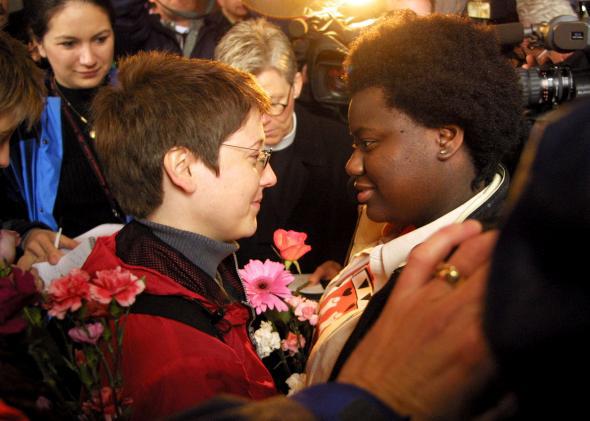On Monday afternoon, U.S. District Judge Michael McShane invalidated Oregon’s gay marriage ban, holding that it violates the equal protection clause of the U.S. Constitution. Much of the opinion is devoted to a legal analysis of the ban itself, which, McShane holds, “cannot withstand even the most relaxed level of scrutiny” after Windsor. But McShane—who is openly gay—also spends considerable time exploring America’s sad history of anti-gay animus, in an effort to explain why that history necessitates constitutional protections for gays and lesbians today:
Generations of Americans, my own included, were raised in a world in which homosexuality was believed to be a moral perversion, a mental disorder, or a mortal sin. I remember that one of the more popular playground games of my childhood was called “smear the queer” and it was played with great zeal. … On a darker level, that same worldview led to an environment of cruelty, violence, and self-loathing.
Despite the dark legacy of bigotry McShane describes, his opinion closes on a note of courageous optimism, gently rebuffing the fears of those who vigorously contest the morality of gay marriage:
Where will this all lead? I know that many suggest we are going down a slippery slope that will have no moral boundaries. To those who truly harbor such fears, I can only say this: Let us look less to the sky to see what might fall; rather, let us look to each other … and rise.
McShane did not stay his ruling or delay its implementation. At present, it appears gay marriage is officially legal in Oregon, and marriages may begin immediately.
The road to McShane’s ruling was surprisingly rocky. First, Oregon’s attorney general refused to defend the ban in court, insisting that it violated the federal constitution—leaving McShane to defend it himself. Then, the National Organization for Marriage filed a motion to intervene at the last minute, in a blatant attempt to prolong the hearings as long as possible. (The group also suggested McShane shouldn’t rule on the case, as his orientation “rais[es] troubling questions about his impartiality.”) Wisely, McShane rejected NOM’s dilatory intervention and ignored its impugning of his judicial objectivity. And now he’s dealt the group a stinging blow, dismissing its anti-gay arguments as constitutionally unfounded.
It’s unclear, however, whether McShane’s ruling will stand for long. Usually, a state’s attorney general will step in to defend a state law once it’s struck down, as occurred in Utah, Idaho, and Arkansas. But several attorneys general, including those in Virginia and Kentucky, have refused to defend their states’ marriage bans, forcing the state to hire private counsel to do the job. Oregon’s attorney general has already refused to defend the law—and it’s unclear whether the state’s liberal governor, John Kitzhaber, is willing to spend state funds to defend a law he deems unconstitutional. If the state refuses to defend the ban in any capacity, McShane’s ruling might simply be unappealable: The Supreme Court has already stated that a group of private citizens (like NOM) has no standing to defend gay marriage bans in court.
Even if the state does hire private counsel to defend the ban, it’s in for some rough sledding. Marriage opponents will be keen to stay McShane’s order, thus halting any further gay marriages in the state. But they’ll be appealing McShane’s ruling to the Ninth Circuit, which recently elevated gays to a constitutionally protected class and will almost certainly refuse to suspend marriage. (After the Ninth Circuit declared its heightened protections for gays, Nevada’s attorney general simply gave up on her state’s marriage ban.) That leaves the Supreme Court as marriage opponents’ last resort. And though the justices may well stay McShane’s ruling, thousands of gay couples will already have obtained their marriage licenses by that point—creating the kind of facts on the ground that Justice Anthony Kennedy won’t be able to ignore.
There’s one more wrinkle in the story. Oregon voters will have a chance to vote in gay marriage this November—and they are almost certain to do so. Even if the Supreme Court stays McShane’s order, then, the whole case could be moot long before it winds up on the justices’ docket. Marriage equality, in other words, is here to stay in Oregon—whether it’s judges or voters who ultimately put the state’s ban out of its misery.
